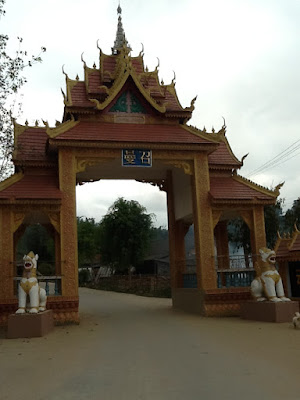Last day in Jinghong Region
December 3, 2011
Menghai Market
We woke up to jubilation and
women singing. I imagined that it was
the continuation of the Akha celebration.
There they were in our little park taking a rest stop on their way to a
village festival!
Market Scenes
 |
| Who Knows? |
 |
| Checking Out the Treasures |
 |
| Dai Woman |
 |
| Mushrooms |
 |
| Tofu |
 |
| A Great Buy! |
 |
| Fire Water |
Last day in Jinghong Region
December 3, 2011
Menghai Market ranks as one of the top markets we have been
able
to visit...It is orderly, quiet, and offers almost
everything one would need. The fruits ad
vegetable diversity is way beyond anything I have known.
Manzao Village - Paper
Making
Clean, concrete walkways throughout this successful village
of about 1300 meters altitude.
Everywhere we saw women preparing the various steps for their mulberry
paper making. The men go to their
mulberry trees in the forest near the village and cut the bark off the
trees. Then the women clean the bark,
soak it, prepare it for the grinding machine, sack the mulberry paste, soak it again in order to prepare it for the
drying screens, after which the screens with thin or thick mulberry paste are
smoothed and placed to dry in the sun standing upright. The village is also engaged in tea,
rice, and vegetable production.
 |
| Paper Drying In Sun |
 |
| Smoothing Paper Before Drying |
 |
| Helpers |
 |
| Village Center |
 |
Tropical Landscape in Village
 |
| Paper Ready to Sell |
 |
| Temple Paintings of Buddha's Life |
 |
| Peacocks, Symbols of the Dai People |
 |
| Dai Village Entry Gate |
 |
| Cleaning the Mulberry Bark Before Papermaking |
This totally
organic product is essential for wrapping the precious Pu'er tea from these
mountains. It's also a geat paper for
photo mounting, painting, Buddhist texts, and treasured throughout the
world. I love the smell of it....
Artisanal Tea Shop
Tea culture, we have found out, is a most complex process. It's similar to wine in many ways. The various fermentation and aging processes, storage containers, marketing, tremendous pricing variation, health impact, and general mystic.
I'm going to briefly describe this valuable Pu'er tea of
Xiishuangbanna and then list the four basic kinds of teas and a few comments of
each.
In this region are six world famous tea mountains. People come from all over China, Taiwan,
Japan to buy the organically prepared Pu'er Tea. The Tea Road has been alive even longer than
the Silk Road and still is vibrant in Xishuangbanna today.
The label for the totally organic
tea that we are tasting carries the following location:
Menghai
(county) Menghun (town) Minggu (village)
great tea 350y for 200 gram. The area is
very near the Burma border.
There are four kinds of
tea with various preparations:
Green Tea
Black Tea - has a one day
fermentation, ages naturally
Sunsha- is put in cakes and let to
ferment or cook slowly
Shoxa - called cooked tea
Sunsha
put in cake and let ferment naturally slow
Black tea
a one day fermentation and let it age
Man-Diyu-Old Dai Village
 |
| Beautiful Setting |
 |
| Importance of School |
 |
| Village Story |

 |
| Community Well |
 |
| Advice in Dai and Chinese Language |
Located outside of Ga-Sa town.
Charming village marked by Dai
traditional gateway with a daily street market alongside the winding walls of
the traditional Dai style home. Lily ponds, traditional banyan village tree, wall art
throughout depicting the right way to live, village tailor, silversmith making
the Dai traditional apparel. On top of
the village hillside resides the village Temple..
Xishungbanna has been a fascinating adventure. Visiting the little unique ethnic villages nestled throughout the hillsides
was thrilling. Investigating the ways of
making a living added much understanding of village ways and life. We are so grateful to all the people who
helped us along the way: hotel guest house staffs, Mr.Peng, our kind driver,
Jacky at Yuan Yang, in Jinghong area, sSara of Forest Cafe, Greg and Pierre, of
Mekong Cafe, fellow travelers along the way, and most of all the kind Chinese
people who almost always provided us the greatest kindnesses.














No comments:
Post a Comment